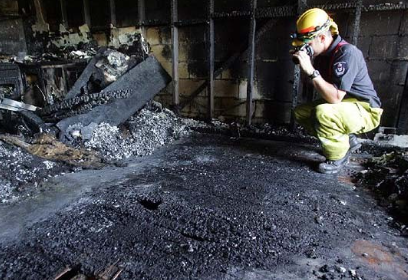The Role of Forensic Engineers in Fire Investigation

In the aftermath of a fire incident, the intricate work of forensic engineers becomes indispensable in unraveling the complexities surrounding the event. Charged with the task of investigating fires, these professionals play a pivotal role in uncovering the root causes, evaluating damages, and recommending preventive measures. This discourse delves into the multifaceted role of forensic engineers in fire investigation, emphasizing their collaboration with fire protection services to enhance safety and mitigate risks.
Understanding Fire Investigation:
Fire investigation is a meticulous process aimed at determining the origin, cause, and contributing factors of a fire event. It encompasses a blend of scientific analysis, engineering principles, and investigative techniques to reconstruct the sequence of events leading to the fire. Forensic engineers are at the forefront of this endeavor, applying their expertise to analyze fire patterns, examine evidence, and draw evidence-based conclusions.
The Role of Forensic Engineers:
1.Scene Examination and Documentation:
Forensic engineers are tasked with conducting thorough examinations of fire scenes, meticulously documenting evidence and collecting data essential for analysis. They employ advanced techniques such as 3D laser scanning and aerial drone photography to create detailed reconstructions of the scene. By preserving and documenting evidence effectively, forensic engineers lay the groundwork for a comprehensive investigation.
2. Fire Pattern Analysis:
One of the key aspects of fire investigation is the analysis of fire patterns, which provides crucial insights into the origin and progression of the fire. Forensic engineers utilize their expertise in fire dynamics to interpret burn patterns, heat damage, and smoke residues. By discerning the direction of fire spread and identifying ignition sources, they can ascertain the cause of the fire with precision.
3. Material and Structural Analysis:
Forensic engineers delve into the structural integrity of buildings and materials affected by fire, assessing their performance under extreme conditions. Through material testing and structural analysis, they identify weaknesses, failures, and vulnerabilities that may have contributed to the fire’s severity. This knowledge informs recommendations for building design improvements and fire protection system upgrades.
4. Electrical and Mechanical Investigations:
In cases where electrical or mechanical systems are implicated in the fire, forensic engineers conduct detailed examinations to determine their role in the incident. They scrutinize wiring, appliances, machinery, and HVAC systems for signs of malfunction, overloading, or improper installation. By pinpointing potential ignition sources and equipment failures, they assist in implementing corrective measures to prevent future incidents.
Read more The Versatile Potato: Creative Cooking Approaches For Every Taste
5. Expert Testimony and Report Writing:
Forensic engineers serve as expert witnesses in legal proceedings, providing impartial analysis and testimony based on their findings. They prepare comprehensive reports detailing their investigations, methodologies, and conclusions, which serve as valuable references for stakeholders. Their testimony aids in the resolution of insurance claims, litigation, and regulatory compliance matters related to fire incidents.
Collaboration with Fire Protection Services:
Forensic engineers collaborate closely with fire protection services to enhance fire safety measures and mitigate risks in the built environment. By sharing insights from fire investigations, they inform the development of proactive strategies for fire prevention, detection, and suppression. This collaboration fosters a holistic approach to fire safety, integrating engineering expertise with practical solutions offered by fire protection services.
Conclusion:
In the realm of fire investigation and fire protection services, forensic engineers serve as invaluable assets, leveraging their expertise to unravel the mysteries of fire incidents. Through meticulous analysis, scene examination, and collaboration with fire protection services, they contribute to the enhancement of fire safety measures and the mitigation of risks in our communities. As guardians of public safety, their role is indispensable in safeguarding lives, property, and infrastructure from the destructive force of fires.



